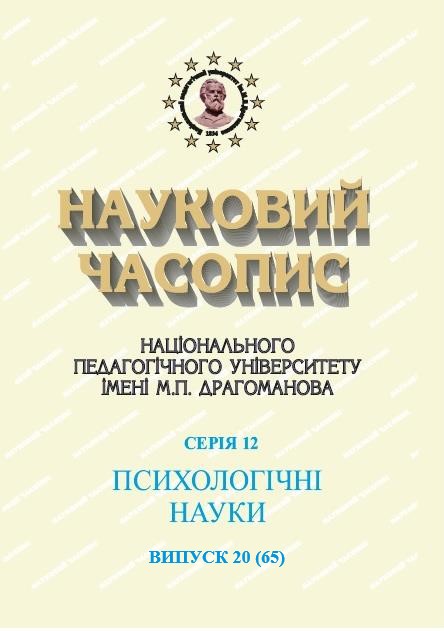REFLECTIVE AND PERSONAL COMPETENCE AS AN IMPORTANT CONDITION FOR THE PROFESSIONAL SELF-CREATION OF THE FUTURE SPECIALIST
DOI:
https://doi.org/10.31392/NPU-nc.series12.2022.20(65).06Keywords:
professional development, self-regulatory ability, reflection, competence, reflective-personal competence.Abstract
Goal. The article analyzes modern methodological approaches in the process of professional formation of a future specialist in the current conditions of education in higher education institutions. The most problematic aspects related to the formation of such subjectivity, which is based on the reflection of one’s own self-changing (self-development), are presented. The results. We have offered our vision of some aspects, which are precisely the basis of the goal of this article – a thorough theoretical analysis of current scientific concepts, in which optimal models of professional self-creation of the future specialist are represented. The subject of our research is related to the professional becoming of specialists in the field of medicine, so in the course of our scientific analysis, we decided to pay special attention to issues related to the identification of differences in the field of self-awareness, in particular, the self-regulatory ability of medical students in institutions of higher education. It is with this important personal formation that the intensity and meaningfulness of the subject’s professional development process is connected. Therefore, we would like to note that the formation of professional self-development of the future medical specialist should be aimed at self-knowledge, self-affirmation, and self-improvement in all spheres of life. We emphasize that the process of professional self-development of students in institutions of higher education requires a deeply realized value of its necessity and sustainable internal motivation of future medical workers. Conclusions. A future specialist, and in particular, a medical specialist, must be aware of their responsibility for the competent design of their life, especially, their professional path, and therefore attend of the formation of such subjectivity, which will be based on the reflection of their own self-change. A special role in this process should belong to reflective and personal competence, which we interpret as the ability to solve topically important, personally significant professional tasks aimed at deepening knowledge and an active and creative attitude and transformation of one’s «I», one’s «Self».
References
- Belei, M.D. (2020). Metodolohichni osnovy fenomenolohichnoi psykholohii v diialnosti praktychnoho psykholoha [Methodological foundations of phenomenological psychology in the activity of a practical psychologist]. Zbirnyk tez naukovykh robit uchasnykiv mizhnarodnoi naukovo-praktychnoi konferentsii «Psykholohiia ta pedahohika: metodyka ta problemy praktychnoho zastosuvannia» – Collection of theses of scientific works of the participants of the international scientific and practical conference “Psychology and pedagogy: methodology and problems of practical application” (Lviv, December 25–26, 2020), (pp. 33-36). L’viv : Lvivska pedahohichna spilnota [in Ukrainian].
- Hrechanyk, O.E., & Hryhorash, V.V. (2019). Formuvannia akmeolohichnoi kompetentnosti vchytelia v systemi pisliadyplomnoi osvity [Formation of acmeological competence of the teacher in the system of postgraduate education]. Kharkiv : Osnova [in Ukrainian].
- Davydov, V.V. (1988). O ponjatii lichnosti v sovremennoj psihologi [On the concept of personality in modern psychologists]. Psihologicheskij zhurnal – Psychological Journal, 9(9), 22–32 [in Russian].
- Karpenko, Z.S. (2009). Aksiolohichna psykholohiia osobystosti [Axiological personality psychology]. Ivano-Frankivsk : Lileia-NV [in Ukrainian].
- Karpenko, Z.S. (2016). Aksiopsykholohichni resursy profesiino-osobystisnoi samorealizatsii [Axiopsychological resources of professional and personal self-realization]. Osobystisno-akmeolohichni faktory vplyvu na samorealizatsiiu indyvidualnosti u polikulturnomu sviti – Personal-acmeological factors influencing the self-realization of individuality in a multicultural world. In Z.S. Karpenko & I.M. Zvarych (Eds.). (pp. 83–91). Chernivtsi : Chernivetskyi nats. un-t [in Ukrainian].
- Radchuk, H. (2017). Dialoh yak mekhanizm aksiohenezu osobystosti v protsesi vyshchoi profesiinoi osvity [Dialogue as a mechanism of personality axiogenesis in the process of higher professional education]. Naukovyi teoretyko-metodolohichnyi i prykladnyi psykholohichnyi zhurnal – Scientific theoretical-methodological and applied psychological journal, 8(1), 103–109 [in Ukrainian]. https://doi.org/10.15330/ps.8.1.103-109
- Tatenko, V.A. (1996). Psihologija v subektnom izmerenii [Psychology in the subjective dimension] Kyiv : Vidavnichij centr «Prosvіta» [in Russian].
- Filonenko, M.M. (2015). Psykholohiya osobystisnoho stanovlennya maybutnʹoho likarya. [Psychology of personal development of the future doctor]. Kyiv : Tsentr uchbovoyi literatury [in Ukrainian].
- Frytsiuk, V.A. (2016). Formuvannia motyvatsii profesiinoho samorozvytku maibutnikh pedahohiv u tvorchomu osvitnomu seredovyshchi VNZ [Formation of motivation for professional self-development of future teachers in the creative educational environment of universities]. Visnyk Vinnytskoho politekhnichnoho instytutu – Bulletin of Vinnytsia Polytechnic Institute, 6, 107–114 [in Ukrainian].
- Frankl, V. (1992). Man’s Search for Meaning. Boston : Beacon Street.
- Maslow, A. (1967). Self-actualizing and Beyond. Challenges of Humanistic Psychology. New York : McGraw-Hill.
- Rogers, C., & Kramer, P.D. (1995). On becoming a person: a therapist’s view of psychotherapy. Houghton Mifflin.
- Tursynay, I., Rymshash, T., Askar, I., Karas, K., & Azhar, K. (2021). Scientific comparative analysis of Professional Self-Development of future social pedagogue in Kazakhstan and abroad. Cypriot Journal of Educational Sciences, 16(4), 1947–1955. https://doi.org/10.18844/cjes.v16i4.6062
- Warsi, L.Q., & Khurshid Kh.(2022). The Role of Self-Assessment in English Language Teachers’ Professional Development in Pakistan. Education Research International, 2022, 1–13. https://doi.org/10.1155/2022/9401995

